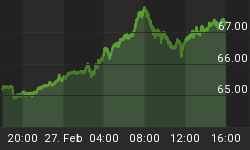Based on the November 2013 Market Overview report.
Without a doubt, the biggest news in recent weeks has been the upcoming replacement of Fed Chairman Ben Bernanke by Janet Yellen, Vice Chair of the Board of Governors and a highly qualified economist who, many predict will continue in the Bernanke mold.
Bernanke's story is actually quite fascinating, and can teach us how to approach future Fed nominations. Before becoming the world's most prominent central banker, Bernanke was a university professor heavily engaged in theoretical considerations about various options of monetary policy. As an authority on the Great Depression of the 1930s, the main topic of his work centered on unusual activities of central banks related to deep recessions that the economy may suffer. His has been a lifelong study of the insidious effects of deflation and the measures that may prevent it.
It was no surprise that he was chosen to succeed Alan Greenspan. Due to the massive Greenspan bubble, significant credit expansion and the real estate mess, creative solutions had to be found and Ben Bernanke was the best man for the job. The best specialist, a sort of Mr. Wolf (from Tarantino's Pulp Fiction) of monetary policy, economic magician ready to prepare new government bullets to back up endangered dollar system.
His tenure as Fed chairman included the biggest financial challenges faced by the U.S. since the 1930s Depression, his academic field of expertise. The remarkable fact is that if one wanted to understand this choice, if one wanted to know the kind of Fed chairman Bernanke's would be, one just had to read his academic articles on exceptional monetary policy tools during times of significant crisis.
What special tools did Bernanke have in mind? Under normal circumstances, the central bank has a specific job: print money and hand it out to the banks. The banks then are supposed to pass that money to lenders who will invest it in businesses that will stimulate economic growth. Sometimes, however, this "monetary transmission mechanism" breaks down (as the Keynesians wrongfully call it, a "liquidity trap" which is when injections of cash into the private banking system fail to lower interest rates and fail to stimulate economic growth). People react by hoarding cash because they expect trouble up ahead. The hallmark of a liquidity trap is short-term interest rates near zero. Then the regular run-of-the-mill printing is doing only part of the job (helping the banks), but not the other part (helping some more and causing disastrous inflation).
In his academic writings Bernanke said that under special circumstances, when the monetary transmission mechanism breaks down, there are three additional tools: (1) shaping long-term expectations about interest rates, (2) expanding the balance sheet of the central bank, (3) changing the structure of expanding the balance sheet of the central bank.
It was all stated openly and clearly in Bernanke's publications. It almost sounded like a short manual written for the central banker for times when the system is in trouble. There was no surprise then that when Bernanke became the Boss, he followed the advice to the letter. We could have used his articles as a tool to predict his moves. For press releases, for quantitative easing, so called operation "Twist", or for other special operations performed by the Fed.
There was one thing, which was not discussed in Bernanke's articles: Fed's chairman's stepping aside. However, there was something about possible central bank's "running out of ammunition"... Is professor Bernanke being fired, or is there perhaps another reason behind his leaving? Isn't it the case that the chairman has in fact no ammunition left, and does not believe in possible success of his actions - perhaps even viewing the massive money printing as unsustainable and leading to runaway inflation? Impossible to know, but we can't rule out such scenario - the one in which even Bernanke might view gold as a great investment.
Thank you.
The above is a small excerpt from our November gold Market Overview report.















